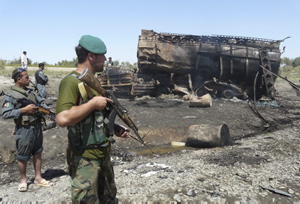|
|
|
Afghan troops secure the site of the Kunduz airstrike. AP photo. |
The Washington Post notes that the reaction to last week’s bombing of the two hijacked fuel tankers in Kunduz province has been “muted.”
Instead, popular and official reaction to the lethal airstrike has been far more tolerant than after similar past incidents. There have been no angry demonstrations against Western occupiers, and no blistering condemnation by President Hamid Karzai or local authorities. So far, not even the families of the dead have come forward to protest.
In a separate story at The Washington Post, Rajiv Chandrasekaran notes that the local Afghan officials have actually supported the strike:
At midday Saturday, after visiting the hospital and flying over the bombing site in a helicopter, the team met with two local officials. The NATO officers were expecting anger and calls for compensation. What they received was a totally unanticipated sort of criticism.
“I don’t agree with the rumor that there were a lot of civilian casualties,” said one key local official, who said he did not want to be named because he fears Taliban retribution. “Who goes out at 2 in the morning for fuel? These were bad people, and this was a good operation.”
But what follows is a stinging indictment of the German military operations, or lack thereof, in Kunduz and the North:
A few hours later, McChrystal arrived at the reconstruction team’s base in Kunduz. A group of leaders from the area, including the chairman of the provincial council and the police chief, were there to meet him. So, too, were members of an investigative team dispatched by President Hamid Karzai.
McChrystal began expressing sympathy “for anyone who has been hurt or killed.”
The council chairman, Ahmadullah Wardak, cut him off. He wanted to talk about the deteriorating security situation in Kunduz, where Taliban activity has increased significantly in recent months. NATO forces in the area, he told the fact-finding team before McChrystal arrived, need to be acting “more strongly” in the area.
His concern is shared by some officials at the NATO mission headquarters, who contend that German troops in Kunduz have not been confronting the rise in Taliban activity with enough ground patrols and comprehensive counterinsurgency tactics.
“If we do three more operations like was done the other night, stability will come to Kunduz,” Wardak told McChrystal. “If people do not want to live in peace and harmony, that’s not our fault.”
McChrystal seemed to be caught off guard.
“We’ve been too nice to the thugs,” Wardak continued.
The Kunduz incident highlights the fact that the under-application of force in counterinsurgency can be just as deadly as its opposite.
Are you a dedicated reader of FDD's Long War Journal? Has our research benefitted you or your team over the years? Support our independent reporting and analysis today by considering a one-time or monthly donation. Thanks for reading! You can make a tax-deductible donation here.









1 Comment
Bill:
Glad I found this report. I had missed it. So often we get fed Islamist propaganda as news. Thanks for all you do.